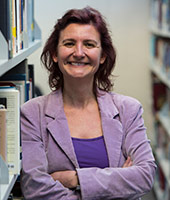Centre Co-Directors
About us: our vision
The Centre for Political Economy, Governance, Finance and Accountability (PEGFA) is a world-leading hub for innovative, rigorous, and impactful research and teaching. Our premise is that social, economic, environmental and political outcomes are shaped by historical context and social norms, institutional and governance structures, and power relations. Our research addresses a broad range of pressing challenges facing modern societies around the world, from creating a green and caring economy to tackling inequalities and the cost of living crisis.
We aim to:
- Research problems that are relevant to society and business, from economic, governance and risk perspectives,
- Produce research-based recommendations for practice and policy with local, national and international impact,
- Support sustainability, fairness, equality, diversity, accountability and development,
- Inform optimal regulation, supervision and intervention.
Our impact on the world
With a focus on impactful world-leading research, knowledge exchange and research-informed teaching in economics, accounting and finance, PEGFA addresses the urgent problems of our time. Our researchers contribute to the development of sustainable public policy and business models by proposing economic, financial and governance solutions to inequalities, climate change, care crisis, and financial instability. Impact, in terms of contributing to sustainability, equality, inclusivity, diversity, and decolonising research and education, lies at the heart of our research and knowledge exchange activities.
PEGFA’s research on economic, social, political, and financial issues contributes to many of the UN Sustainable Development Goals (SDGs). Examples include:
- Our research on the causes and consequences of multiple forms of inequality (income, wealth, gender, race, regional, international), which supports No Poverty (SDG1), Zero Hunger (SDG2), Gender Equality (SDG5), Decent Work and Economic Growth (SDG8), and Reduced Inequality (SDG10);
- Our research on greening the economy and finance for ecological and financial sustainability and tackling climate change and the energy crisis, which promotes Clean Water and Sanitation (SDG6), Affordable and Clean Energy (SDG7) and Climate Action (SDG13);
- Our research on investing in a caring economy for a sustainable solution to the care crisis and demographic change in an aging society, which supports Good Health and Wellbeing (SDG3), Quality Education (SDG4), and Gender Equality (SDG5);
- Our research on the effects of technological innovation, which supports Industry, Innovation and Infrastructure (SDG9) by analysing both the growth and distribution channels through which technological change affects firms, industries, localities and the society at large;
- Our research on governance and regulation, financial risk management, social contribution of finance, corporate social responsibility, business ethics, and supervision for ecological, social and financial sustainability, which supports the Peace, Justice and Strong Institutions (SDG16);
- Our knowledge exchange work in terms of public and community engagement and working with the public and third sector, which supports Partnerships for the Goals (SDG17).
Who we are
An interdisciplinary approach
The world’s problems are too large and complex to be solved by a single expertise alone. PEGFA comprises three groups - CGRA (Centre for Governance, Risk and Accountability), GPERC (Greenwich Political Economy Research Centre) and Public Services International Research Unit (PSIRU) - is dedicated to truly interdisciplinary research. Alongside a critical mass in economics, finance and accounting, we bring together experts in gender studies, business management, sociology, politics and history. Regardless of specialism, each PEGFA researcher is mission-orientated to achieve sustainability in all its dimensions: environmental, economic, financial, and social.
Partners
PEGFA forms strategic partnerships, knowledge exchange, and active collaborations based on research projects with a wide variety of experts and decision-makers at the local, national and international level. These include:
- Leading universities in the UK (e.g., King’s College London, Leeds, SOAS, Queen Mary, University of West of England, Hertfordshire, Brunel) and abroad (Duesburg, Berlin School of Economics, Kemnitz, Paris 13, Lisbon, Madrid, Navarra, Pavia, Marche, Milan, WU-Wien, Columbia, University of Massachusetts/Amherst, Bogazici, ITU, Azim Premji, Witwatersrand Johannesburg, Brasilia, Anhui);
- Regulatory bodies (e.g., Financial Conduct Authority, the UK Statistics Authority) and trade associations (e.g. the Association of British Insurers);
- Research networks (e.g., Meta-Analysis of Economics Research Network, Cochrane and Campbell Collaboration Economics Method Group, Forum for Macroeconomics and Macroeconomic Policies, Financial Management Association, Post-Keynesian Economics Society, Institute of Chartered Accountants in England and Wales)
- Civil society organisations (e.g., Women’s Budget Group, Foundation for European Progressive Studies, Autonomy, Green Peace, New Economics Foundation, Hans Boeckler Foundation);
- Policy institutions (e.g. central banks, regional development banks such as Asian Development Bank, UN institutions).
Funding
The research of the Centre for Political Economy, Governance, Finance and Accountability is supported by research grants from the Economic and Social Research Council, British Academy, Leverhulme Trust, Climate Works Foundation (INSPIRE), UN/UNCTAD, UN International Labour Office (ILO), Hans Boeckler Foundation, the Foundation for European Progressive Studies (FEPS), Hewlett Foundation, the Institute of New Economic Thinking (INET), Women’s Budget Group, Network for Social Change, New Economics Foundation (NEF), Friedrich Ebert Foundation, International Trade Union Confederation (ITUC), Austrian Chamber of Labour, Korean Development Institute, and other renowned institutions.
Our research
PEGFA is distinctly positioned as an interdisciplinary, multi-faceted centre with expertise in economics, finance, accounting, gender studies, business, and sociology, method specialisms in both quantitative and qualitative methods to offer rigorous interdisciplinary theoretical and empirical research as a foundation for policy analysis. We embrace both theoretical and methodological pluralism.
The multiple strands of research at PEGFA reflect the economic, financial and societal challenges we seek to address. These include:
- Greening the economy and finance for ecological and financial sustainability
- Investing in the care economy
- Causes and consequences of inequalities
- Productivity, innovation and equality in the age of technological change
- Finance, governance, institutions and regulation for sustainability
- Public investment and fiscal policy: evidence-based public policy
- Globalisation and global imbalances
- Development (global, regional and local), decolonising research and education
- The effects of financialization on the economy
- Behavioural economics and finance
- Unemployment, employment, work, labour market institutions
- Performance management and control
See our list of publications for recent outputs in these areas.
Greening the economy and finance for ecological and financial sustainability
PEGFA is world-renowned for its research and expertise on the green economy, ecological sustainability, climate change and the energy crisis. Using innovative ecological macroeconomic modelling and micro data analyses, PEGFA staff made concrete proposals about how green public investment and taxation can contribute to decarbonisation, and how central banks, including the Bank of England (BoE), can green their monetary policy. These proposals have been developed in collaboration with think tanks (e.g., New Economics Foundation, Women’s Budget Group, Greenpeace, Foundation for European Progressive Studies), and have affected actual policy decisions (e.g. decarbonisation of the quantitative programmes of the BoE and the European Central Bank (ECB)). Due to this impact there is now high demand for the work of PEGFA, e.g. by the World Bank on the greening of fiscal policy, the World Wide Fund for Nature (WWF) on transformation of the financial system, and central banks for developing their capacity building programmes on climate change.
Investing in the care economy
Our staff conduct high profile work on the care economy in a time when societies are aging and experiencing rapid demographic and technological change. Our research demonstrates the beneficial macroeconomic effects of investing in the care economy on employment, gender, income and wealth equality, and just transition to a zero-carbon and caring economy. This research provides evidence for a paradigm shift towards a needs-based approach to macroeconomic policy for a green caring just society. The findings are crucial for policies to support recovery after Covid-19 and cost of living crises in the post-Brexit UK and the world. PEGFA staff have been part of the global Care Economy Network, and invited to the Task Force on Employment by the Nobel Laureate Prof. Joseph Stiglitz. The team have further developed a novel analysis to explore the employment creation potential of investing both in the green and care economy for a research project commissioned by the ITUC.
Causes and consequences of inequalities
A central objective of the work at PEGFA is to analyse both the causes and impacts of inequalities at multiple dimensions in terms of income, wealth gender, race, as well as at regional, and international levels. In particular our research analyses the effects of inequalities and economic policies on GDP, employment and productivity.
Productivity, innovation and equality in the age of technological change
This research strand analyses the incentives for and effects of Research and Development (R&D) investment on firm survival, employment and productivity using micro-econometric data. Results indicate that there is high degree of heterogeneity in the effect of public subsidies on business R&D and its effects.
Finance, governance, institutions and regulation for sustainability
A key strand of research at PEGFA is to analyse the impact of governance and regulations including banking regulation and supervision and corporate governance to improve financial risk management and the social contributions of finance. Our research on social responsibility, accounting and business ethics build on critical accounting with an aim to improve international accounting standards and financial sustainability. A key constraint on the survival and development of small businesses anywhere in the world, but especially in less industrialised regions, is access to finance and insurance for their operations, particularly for innovations. A Recent research with societal impact at PEGFA focused on influencing policy and practice so as to improve the provision of credit and insurance coverage for smallholder farmers in Africa. Our deputy director, Mundy, has key roles in
national governance institutions such as the Financial Conducts Authority’s Financial Services Consumer Panel, the Audit and Risk Committee of the UK Statistics Authority and trade bodies, such as the Association of British Insurers/Consumer Advisory Group, all contributing to knowledge exchange.
Method specialism
We offer an inventory of method specialism:
- Panel-data methodologies for macro- and micro-econometric data,
- Time-series econometric methods for system of equations
- Treatment-effect and program evaluation methods
- Single-state and multiple-state event history models, state transition and resilience models, risk and survival models
- Evidence synthesis through systematic reviews, meta-analysis and cumulative meta-analysis
- Agent-based, stock-flow consistent models
- Qualitative methods including narrative and discourse analysis, interviewing, surveys, and focus groups
Publications/Output
Directors
Professor Özlem Onaran
Associate Head of the School of Accounting, Finance & Economics - Research & Knowledge Exchange, Co-director of PEGFA
Professor Alex Stojanovic
Head of School Accounting, Finance & Economics ; Director of Centre for Governance, Risk and Accountability; Co-Director of Institute of Political Economy, Governance, Finance and Accountability
Deputy Directors
Dr Julia Mundy
Associate Professor, Postgraduate Research Programme
Professor Mehmet Ugur
Professor of Economics and Institutions
Dr Vera Weghmann
Director of Public Services International Research Unit Associate Professor in the Political Economy of Public Services
Rafael Wildauer
Associate Professor in Economics
Dr Kefei You
Associate Professor
Experts
Dr Adeyemi Aderin
MBA Finance Programme Leader and Senior Lecturer in Accounting & Finance
Dr Faith Adobamen
Senior Lecturer, International Business
Dr Zunaira Aman
Lecturer in MBA International Business
Dr Ana Armstrong
Senior Lecturer in Fintech
Dr Mary-Paz Arrieta-Paredes
Senior Lecturer in Business Finance and Economics
Dr Muhammad Arsalan Nazir
Senior Lecturer in Entrepreneurship
Dr Trung Bao Hoang
Senior Lecturer in Financial Management
Dr Nadia Benbouzid
Associate Professor in Finance
Adotey Bing-Pappoe
Senior Lecturer
Dr Karen Brickman
Head of School for Business, Operations and Strategy
Dr Neslihan Cetinkaya
Lecturer in Financial Accounting
Dr Kalliopi Chatzi
Lecturer in Financial Accounting
Dr Zhizhen Chen
Senior Lecturer
Dr Yuliya Darmenova
Lecturer in Business
Dr Olufemi Sallyanne Decker
Associate Professor
Helen Evans
Senior Lecturer in Finance
Dr Xiaowen Gao
Associate Professor in Accounting and Finance
Mahkameh Ghanei
Principal Lecturer
Michail Giannoulakis
Lecturer in Accounting and Finance
Dr Francesco Guidi
Senior Lecturer in Economics
Dr Alexander Guschanski
Associate Professor in Economics
David Hall
Visiting Professor, PSIRU
Dr Chusu He
Lecturer in Finance
Dr Md Tarikul Islam
Senior Lecturer in Management Accounting
Dr Robert Calvert Jump
Associate Professor in Economics
Dr Woo-Young Kang
Lecturer in Finance
Dr Vicky Lee
Lecturer in Finance
Dr Xianmin Liu
Lecturer in Finance
Dr Emanuele Lobina
Associate Professor, Public Services International Research Unit (PSIRU)
Dr Pedro Machado
Lecturer in Economics
Dr Tesfa Mehari
Lead Tutor, Principal Lecturer
Menna Mohamed
Lecturer in Management Accounting
Dr Joanna Molyn
Senior Lecturer
Dr Thu Nguyen
Lecturer in Management Accounting
Tue Anh (Jenny) Nguyen
Senior Research Fellow for PSIRU
Dr Maria Nikolaidi
Associate Professor in Economics
Dr Patricia Ntozi-Obwale
Senior Lecturer
Dr Cem Oyvat
Associate Professor
Dr Panagiotis Panagiotou
Senior Lecturer in Finance and Banking
Dr Athina Piterou
Lecturer in sustainability
Jeff Powell
Associate Professor in Economics
Dr Lianfeng Quan
Associate Professor in Accounting and Finance and Academic Portfolio Lead (Finance)
Thomas Rabensteiner
Lecturer in Economics
Dr Dawn Reilly
Associate Professor of Accounting, Head of School of Management and Marketing
Dr Antonella Russo
Associate Head Student Success, School of Accounting, Finance and Economics
Dr Navjot Sangwan
Lecturer in Economics
Dr Sohan Sarwar
Senior Lecturer in Finance
Dr Rami Shamseen
Programme Leader, BA Marketing Suite, BA Public Relation & Communications and Lecturer in Finance and Marketing
Dr Jingwen Shi
Lecturer in Accounting & Finance
Dr Adi Sodhi
Senior Lecturer in Accounting and Finance
Dr Edna Solomon
Academic Portfolio Lead (Economics), School of Accounting, Finance and Economics
Dr Guoxiang Song
Senior Lecturer
Dr Tendai Douglas Svotwa
Senior Lecturer in Management
Dr Luca Tasciotti
Senior Lecturer in Economics
Kevin Williams
Academic Portfolio Lead and Programme Director
Dr Lili Yan
Senior Lecturer in Finance and Banking
Rui Ye
Lecturer in Financial Accounting
Yuliya Yurchenko
Senior Lecturer in Political Economy
PhD Students
Text here
Our Groups
We all have the power to make a positive difference no matter how small the action

Greenwich Political Economy Research Centre
GPERC is a support hub for disciplines such as economics, employment relations, business and management studies, politics, history, sociology, law, geography and the built environment.

Centre for Governance, Risk & Accountability
The CGRA's strategy is to create a virtuous circle of learning and enterprise between industry, public sector, business and local community, and academia.

Public Services International Research Unit
PSIRU examines the social, economic and political aspects of privatisation and liberalisation in water, energy, waste management, health care and social care as well as role and structure of public services and public finance globally.

























































